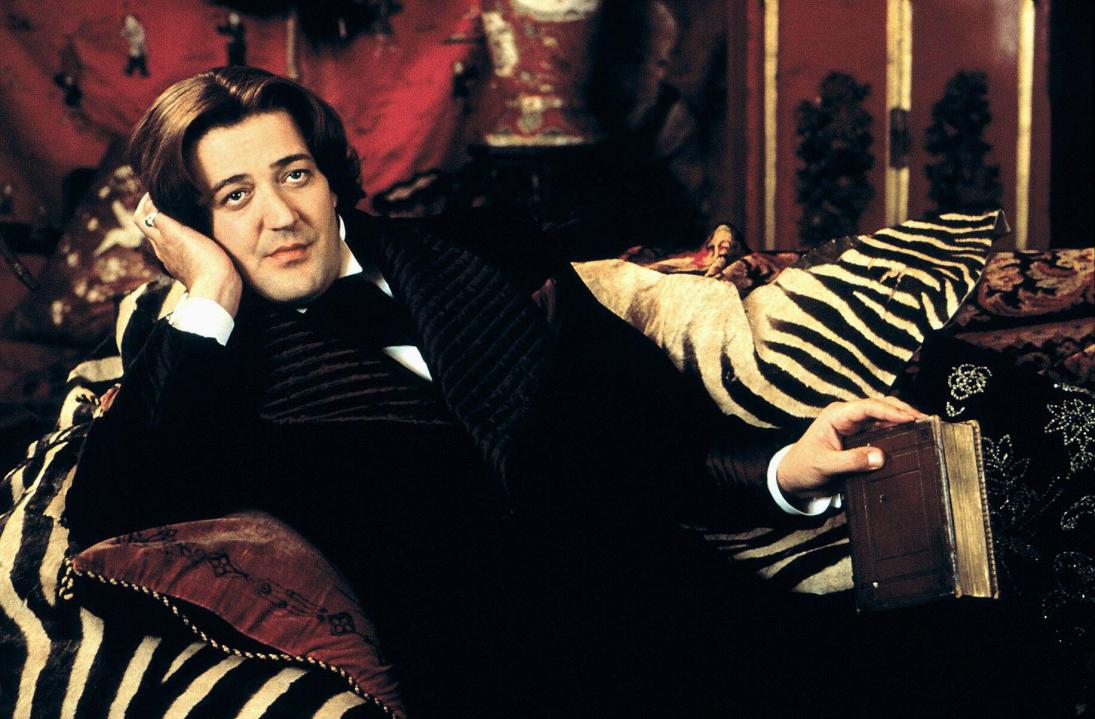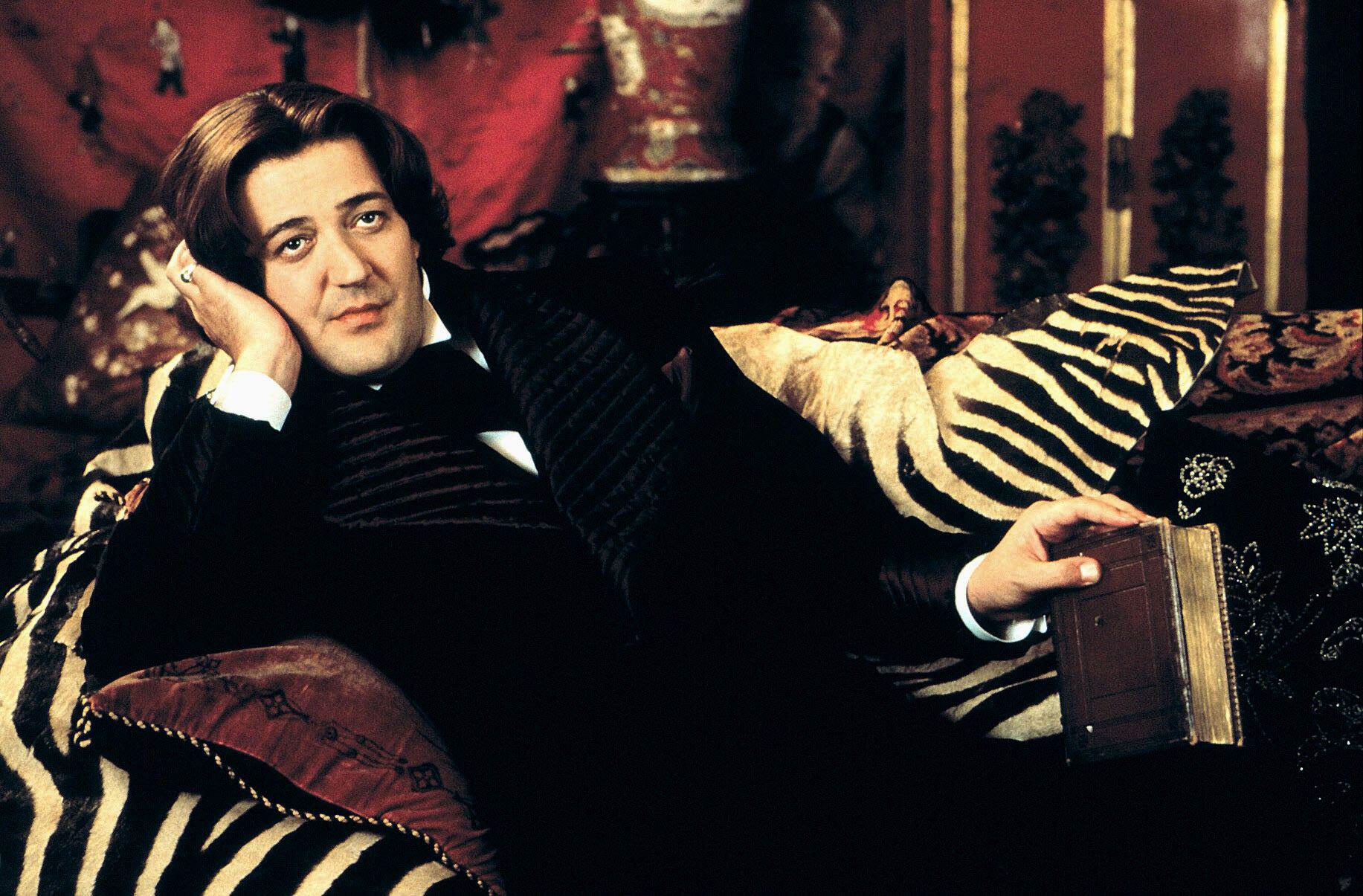It is 122 years this week since Oscar Fingal O’Flahertie Wills Wilde died – in exile, poverty and disgrace – at Paris’s shabby St Germain Hôtel d’Alsace. His last words were said to be: ‘My wallpaper and I are fighting a duel to the death. One or the other of us must go.’
Despite Wilde’s precipitous fall from grace and the ignominy heaped upon him (his children had to change their surname to Holland), within a relatively brief time his plays were revived and books reissued to renewed popular acclaim. And more than a century later, that appeal hasn’t faded: this year in England alone, The Importance of Being Earnest toured the north and Richard Strauss’s adaptation of Salome was performed at the Royal Opera House.
But some of the best adaptations of Wilde’s work can be found on screen. As a child of the 1970s, I was introduced to Wilde via Michael Mills’s wonderfully affecting animated versions of The Selfish Giant (1971) and The Happy Prince (1974), which Thames Television were wont to play during the school holidays. Both can still be found to watch online. To twist Wilde’s cruel jibe regarding Charles Dickens’s sickly waif, the tiresome Little Nell: ‘One must have a heart of stone to watch Mills adaptations without shedding a tear.’
Here are selection of films inspired by Wilde that have also stood the test of time:
Wilde (1997) – BBC iPlayer, Amazon Prime, Pluto TV
Along with Rupert Everett, Stephen Fry is probably the best-known Wilde aficionado; both have portrayed the playwright in very personal biopics. In this one Fry is joined by Jude Law as Wilde’s unpleasant lover Lord Alfred ‘Bosie’ Douglas, with Tom Wilkinson as his unhinged father John Douglas, 9th Marquess of Queensberry, who famously brought about Wilde’s fall with his illiterate note accusing him of being a ‘posing somdomite’. According to Wilde’s grandson Merlin Holland, Oscar effectively talked himself into his prison sentence (two years’ hard labour for gross indecency) by his tendency to show off his obvious wit.
The Importance of Being Earnest (2002) – Amazon Rent/Buy
From the many screen adaptations of Wilde’s most famous play (‘a trivial comedy for serious people’), I’ve chosen Oliver Parker’s 2002 film, starring Rupert Everett and chum Colin Firth, with Tom Wilkinson popping up again. This cute comedy of errors revolves around adopted children and revealed identities. At the time ‘Earnest’ was the popular codeword for being gay – a typical example of Wilde flying close to the wind. An excellent print of the 1952 version can also be found online; Dame Edith Evans plays Lady Bracknell and gives the definitive onscreen recitation of: ‘A handbag?’
An Ideal Husband (1999)
Oliver Parker’s earlier Wilde movie is a darker tale of blackmail and political corruption, themes which continue to resonate today. A top-notch cast includes Cate Blanchett, Minnie Driver, Rupert Everett (again), Julianne Moore, Jeremy Northam, John Wood, Lindsay Duncan, Peter Vaughan, Jeroen Krabbé and Simon Russell Beale.
The Happy Prince (2018) – Amazon Rent/Buy
Rupert Everett writes, direct and stars in his passion project about the sad final years of Wilde in exile. Not exactly a laugh a minute, but a well-made picture with sincerity at its core. Colin Firth (as Wilde acolyte Reggie Turner) helped get The Happy Prince funded by agreeing to appear in his friend’s movie, good egg that he is. And it wouldn’t be an Oscar Wilde film if Tom Wilkinson weren’t in it, so he is, in the role of Father Dunne. Béatrice Dalle (of Betty Blue fame) also features.
The Canterville Ghost (1996)
Wilde’s first published story has been adapted umpteen times, most famously in 1944 with Charles Laughton as the spectral Jacobean Sir Simon de Canterville, fated to roam the halls of his ancestral home until he overcomes his cowardice – quite unlike the original tale, where the ghost was cursed for killing his wife, and after being plagued by a rich American family who bought the hall finally found peace through the power of love (very much a Wildean theme). Many versions of The Canterville Ghost are available to watch online, including the 1986 TV movies with John Gielgud as the phantom; 1996, Patrick Stewart; and 1997, Ian Richardson. I’ve selected the Pat Stewart take as it hews closer to Wilde’s story. The late Leslie Phillips appears as the present-day George, Lord Canterville. A long-delayed animated feature starring Stephen Fry, Hugh Laurie and Miranda Hart is expected at some point.
Oscar Wilde (1960) and The Trials of Oscar Wilde (1960)
Robert Morley makes a most unlikely Wilde in Gregory Ratoff’s low-budget Oscar Wilde, the first of two biopics released in 1960. I assume the actor’s resume of historical roles (W.S. Gilbert, George III, Louis XI, Louis XVI and Charles James Fox) convinced the producers he was the man for the job. It’s not a bad film, but I prefer Peter Finch’s technicolour The Trials of Oscar Wilde, which boasts a superbly OTT performance from Lionel Jeffries as the deranged Marquis of Queensbury. John Fraser plays Bosie, bearing a distinct resemblance to Jude Law, something Fraser himself alluded to. Finch later went on to star as a gay Jewish doctor Daniel Hirsh in John Schlesinger’s Sunday Bloody Sunday (1971). Both films were released before homosexuality was decriminalised in 1967, along with Dirk Bogarde’s earlier Libel (1959). None proved successful at the box office.
Dorian Gray (2009) – Freevee, Amazon Rent/Buy
Director Oliver Parker’s apparent Wilde fixation continues, but in a different direction. This is a sexed-up Hammer Horror take on the demimonde life of the titular character, played by Ben Barnes (Westworld/Gold Digger). Colin Firth is wheeled out again as Gray’s tutor-in-vice, the naughty Lord Henry Wotton, who later sees the error of his ways when his pupil begins to follow an even darker path. A strong cast is rounded out by Rebecca Hall, Ben Chaplin, Emilia Fox, Rachel Hurd-Wood and Fiona Shaw. In 2000 Stuart Townsend essayed an enjoyably preening supervillain version of Gray in The League of Extraordinary Gentlemen (2003).
A Good Woman (2004) – Amazon Prime, Sundance, Disney+
Mike Barker (To Kill a King) gives Oliver Parker a break in his 1930s-set adaptation of the comic melodrama Lady Windermere’s Fan. Helen Hunt plays seductress Mrs Erlynne, with Scarlett Johansson and Mark Umbers (Agatha Christie: Ordeal by Innocence) as the couple caught in her web. Tom Wilkinson (yet again) and John Standing (The Happy Prince) also appear.
A Man of No Importance (1994)
Albert Finney plays Wilde-obsessed closeted Dublin bus conductor Alfie Byrne, who is preparing to stage his version of Salome at the local church hall. Good luck with that, as the saying goes. Brenda Fricker, Michael Gambon, Tara Fitzgerald, Rufus Sewell, Patrick Malahide and Jonathan Rhys-Meyers (in his first film role) provide able support. Suri Krishnamma’s movie received excellent reviews and was adapted into a musical; Jim Parsons (Big Bang Theory) is currently starring in an off-Broadway revival.
Salome’s Last Dance (1988)
Ken Russell’s predictably outrageous movie makes a virtue of necessity, using his meagre budget to present Wilde’s play with a framing device of the writer’s visit to a brothel, where the employees provide an impromptu performance of his salacious New Testament diversion. Russell stated of the film: ‘I bet someone could make it for a million dollars and still make it look quite lavish; I didn’t quite manage that, but I did make it for one million, three hundred and fifty thousand dollars, which is peanuts. I shot it in three and a half weeks.’ Nickolas Grace (Brideshead Revisited/Robin of Sherwood) is Wilde, with a young Douglas Hodge (The Great/Joker) as Bosie/John the Baptist and Glenda Jackson playing Herodias/Lady Alice. The picture ends with Wilde’s arrest.
What are your favourite Oscar Wilde films? Share your recommendations below.






Comments